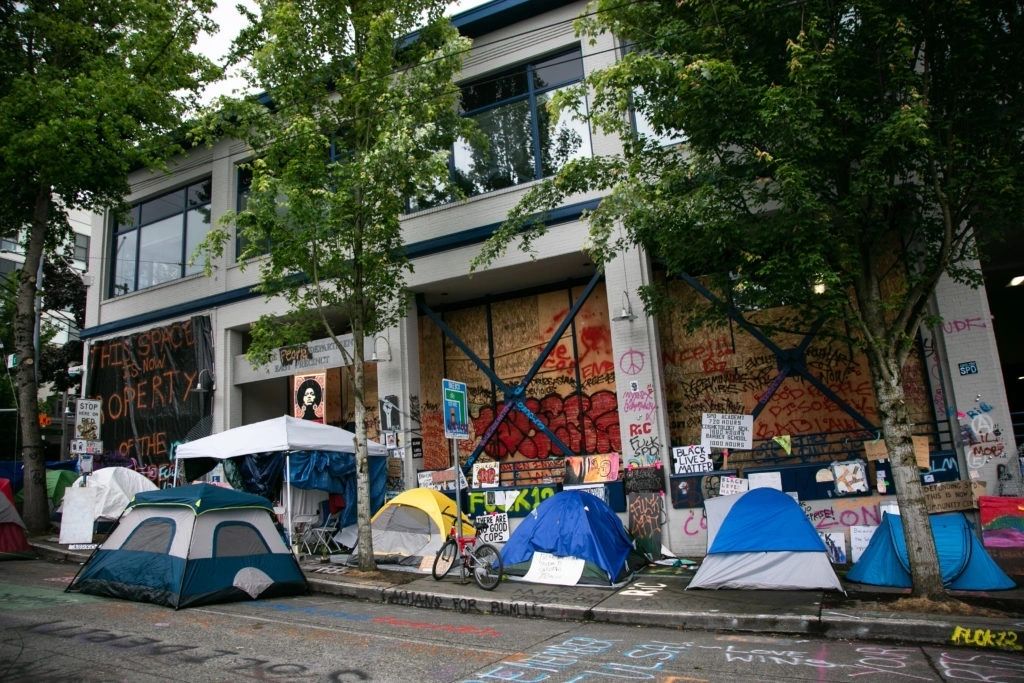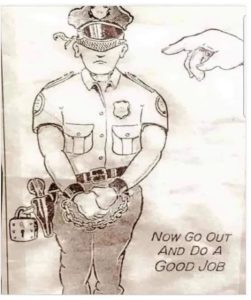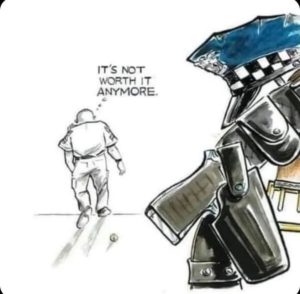Denny Park is Seattle’s oldest, dating back to 1883. Walking paths are lined with azaleas, rhododendrons, and trees from around the world including Japanese snowbells and Sawara cypress. In 2017, the park underwent a $2 million renovation with new planting beds and an automatic irrigation system. The Seattle Times reported at the time that “plans are in the works to also pump up the fun factor in the park,” including food trucks, concerts, and movie nights. The Seattle government’s website describes Denny Park as a “peaceful green island” where “trees shield the grass and its sprawling occupants from city noises until it’s time to return to the working world.”
A pleasant fiction obscuring an ugly truth. Today, Denny Park is a crime-ridden, garbage-strewn, rat-afflicted encampment which is avoided by all but the addicts and criminals who’ve taken it over. Tents are everywhere. In October, a KOMO TV News reporter spotted a pile of used needles near the children’s play area. The Seattle police have said an active crime ring works within the park. The place is dangerous and filthy.
Many other Seattle parks have been ruined. The charming Ballard neighborhood—once the home of immigrant Scandinavian fishermen and boat builders—opened a new park in 2005, occupying almost a full block, with a skate park, water feature, and long stretches of grass. Five and six-story condominiums quickly sprang up with views overlooking it. A neighborhood group, the Ballard Alliance, wants a new children’s play area in the park: “Our vision is to provide a new opportunity for year-round active play for young children and their families.”
Oops. The last time I drove by the park, 24 tents filled it. Gesturing widely and angrily, two men yelled at each other as I walked by. A woman had nodded off, and was slumped sideways on a bench. The day was sunny and warm but no children were in the park, no families. A breeze lifted several pieces of garbage across the grass.
For a while, the city tried clearing the camps. In 2019, 833 camps were removed by Seattle’s Navigation Team, which is a group of outreach workers and policemen. The tents pop back up as quickly as they are removed.
But what is the problem with parks filled with these unfortunate people? Why might we object to their squatting on public land?

Crime, for one. Jonathan Choe of KOMO TV News says that bicycle parts are the top selling items at the tent encampments. At the Ballard Commons, a man was selling racing bicycles hidden under a tarp. The seller, identified as Tony Clark, said none of the bikes had been stolen and, presumably with a straight face, told Choe that all his inventory was donated by strangers, collected on the streets, or picked up in the trash. Security cameras around the Ballard Commons show drug use and persistent vandalism, according to Joel Moreno at KOMO. Confrontations with neighboring business people are common.
Not all the crimes involve petty theft. Five shootings were reported at the homeless camp in Seattle’s Pioneer Square in April and May, including one victim who was badly injured. Dearborn Street is lined with tents, and auto repair shop owner Curtis Marr told KOMO that a gun battle erupted, with one man receiving a bullet wound in his leg. The encampment on Weller Street has about sixty tents. In May there were three shootings, along with thefts and robberies. Donald Mar owns property along Weller Street, and he told reporter Matt Markovich at KOMO, “There’s so much crime here, it’s unbearable. It’s almost like we are under siege.”
Oceans of trash fill the tent camps. In 2017, the city of Seattle cleaned up The Jungle, a tent camp near I-5 highway downtown, and removed 3,000 tons—not pounds: tons—of trash. In the first quarter of 2019, the city removed 355 tons of trash from 71 tent camps. Needles are everywhere. A Seattle police officer walking in Baker Park in the city’s Crown Hill neighborhood stepped on a used syringe in 2018 that penetrated his shoe and pierced his foot. At Harborview Hospital he was given treatment to prevent HIV and hepatis. Many parents no longer take their children to Seattle parks.
Most Seattle politicians cannot bring themselves to name the problem, insisting on the words homeless and—even less judgmentally—unsheltered. These words infer that a poor fellow is living in the park because he just lost his job or that a family has been evicted by a heartless landlord. This is not who are in the camps.
The roots of the problem are drug and alcohol addiction and mental illness. “I’m addicted to drugs I’m not ashamed to admit it, it’s the main reason and I can look at the camera and say this, the main reason people are out here is drugs,” Chris Thompson told KOMO reporter Michelle Esteban. Sitting on a chair in a camp near the Space Needle, Melissa Burns told KOMO’s Eric Johnson, “I have not met anyone else on the street who is not in some phase of addiction. … I would say a hundred percent of the people that I have met out here are at some level of addiction. A hundred percent.”
What is the city of Seattle doing about the takeover of its parks and other public spaces? So little as to amount to nothing. For three years the Navigation Team visited camps to offer shelter and other services and then cleaned up the areas but it has been defunded by the city council, and in October the mayor suspended the team. In late October, the council approved a homeless outreach plan, where the campers will be offered services. The Seattle police will not be involved.
When the Navigation team referred people living on the street to a shelter, only 25 percent enrolled in the shelter within two days. Andrew Constantino, who has lived in a tent in Seattle, told the Seattle P.I. that shelters take away a person’s agency over his own life. The shelters have rules. One of them is that you can’t take drugs, which may be the main reason offering shelter to the addicts on the street is such a failure.
“Defund the Police” is more than a mere slogan in Seattle, where the latest city budget slashes police funding by eighteen percent. Seattle’s Assistant Police Chief Deanna Nollette told KOMO, “At this point we do not have the capability or support from the city to go after these low-level property crimes.”
Things may get worse. Seattle council member Lisa Herbold, who chairs the council’s public safety committee, has proposed that misdemeanor charges be dismissed if the defendant can show signs of substance abuse, mental illness, or if the crime was related to poverty. The Seattle Times concludes that “Stalking, harassment, vehicle prowls, sexual exploitation, property destruction, hit-and-run, threatening someone with a gun—all would be minimized and easily defensible under Herbold’s plan.”
The folks in these camps need help. If the funds were used effectively few Seattleites would object to money spent to assist the substance abusers and the mentally ill. But millions of dollars have been devoted to trying to help people in the camps, and it has resulted only in more camps and more campers.
What would work? Enlightened civil commitment laws for addicts, alcoholics, and the mentally ill who harm themselves and their communities may be the only solution. But these laws are out of fashion and the prospect of them being reinstituted is small, especially in leftist Seattle.
So what will be done? Nothing may be too strong. Not much is about right. Seattle is awash in homeless camps and is likely to stay that way.
James Thayer
James Thayer is a lawyer and novelist.






